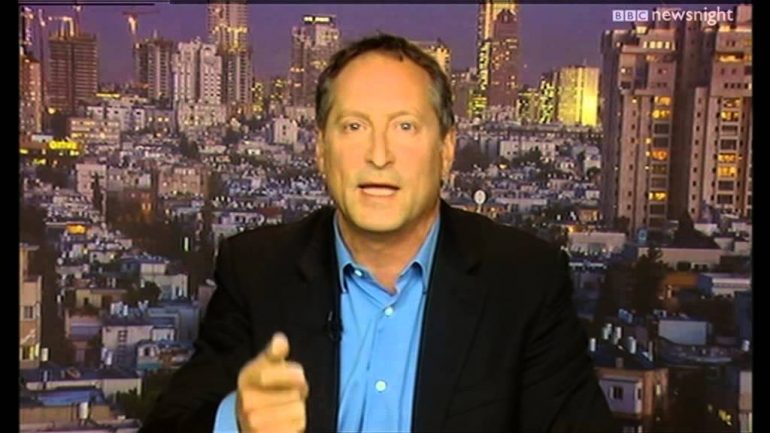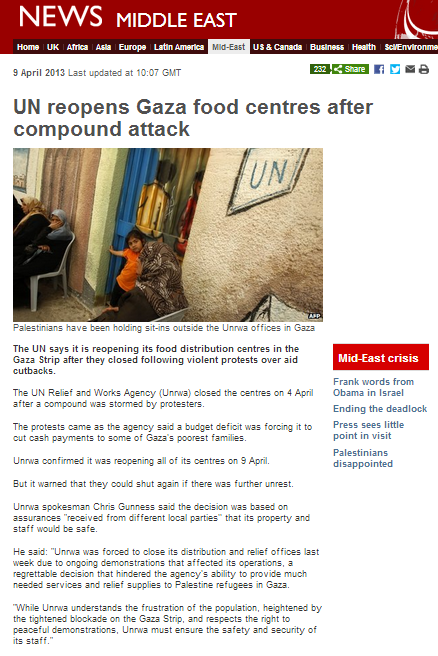On February 4th BBC Two’s flagship news programme ‘Newsnight’ featured interviews with Oxfam’s Director of Policy Ben Phillips and the CEO of SodaStream, Daniel Birnbaum.
[youtube=http://www.youtube.com/watch?v=cd9ioQrTqoY&feature=youtu.be]
Viewers were no doubt amazed by the disingenuous performance given by a senior employee of a multi-million pound charity which gets a considerable amount of public money via funding from various governments, including the UK, an additional income from the EU and the UN (see section 8 here).
The interview is introduced by presenter Jeremy Paxman.
JP: “Well with us now is Ben Phillips, the Director of Policy for Oxfam. Ahm..if these Palestinians are being well paid and being paid the same as their Israeli compatriots or, sorry, their Israeli colleagues, ahm…what’s wrong?”
Ben Phillips: “Our criticism is not of SodaStream’s labour conditions. The issue is is [sic] that factory doesn’t belong to Israel. It doesn’t belong to SodaStream. It belongs to the people who own that land, who were thrown off that land in order that settlements can be built.”
As is the case in the rest of the world, the fact is that the SodaStream factory of course belongs to the people who invested money to build and operate it, so Phillips’ assertion is obviously ridiculous. As for his claim that people “were thrown off that land”, he of course provides no factual evidence for his slur. In fact, even the campaigning NGO ‘Peace Now’ was forced to retract claims made in 2006 (which, incidentally, remain on the BBC News website without any correction) that Ma’ale Adumim – the community adjacent to the Mishor Adumim industrial park where the SodaStream plant is situated – was established on land of which over 86% was owned by Palestinians and to reduce its claim to 0.5%. Phillips continues:
“This isn’t about soda and it’s not about celebrities; it’s about settlements. The settlements impoverish the Palestinians and if I said to you, Jeremy, that I’ve taken your house but now you can have a job – now I’ve turned it into a hotel – as a porter, that wouldn’t be enough. So the issue is settlements. Settlements hurt Palestinians.”
Phillips of course neglects to mention that the Palestinian Bureau of Statistics reported in 2013 that some 20,000 Palestinians employed in communities in Judea & Samaria received more than double the salaries paid by Palestinian employers.
JP: “So if this factory were inside Israel there would be no problem for you.”
BP:” Oxfam doesn’t support the boycott against Israel. We’ve been very, very clear about that. This factory and the settlements are not in Israel. That’s the position of international law and the settlements hurt Palestinians.”
Not only does Jeremy Paxman fail to inform viewers that there are many different interpretations of the “international law” invoked by Phillips, but he then goes on to further mislead them by describing the 1949 Armistice lines as borders, in contravention of the BBC’s own guidelines on the subject.
JP: “So if it was inside the pre-’67 borders – Israeli borders – you wouldn’t have a problem.”
BP: “We’ve never called for a boycott of Israel.”
Phillips apparently hopes that viewers will have forgotten Oxfam’s Belgian branch’s anti-Israel poster of 2003 (later withdrawn) which urged the public “n’achetez pas de fruits et legumes israeliens” (do not buy Israeli fruits and vegetables). Perhaps too he counts on the fact that audiences will not recall Oxfam’s treatment of Kristin Davis back in 2009. 
He also apparently relies on the public’s not knowing that a major Oxfam partner – Zaytoun – which markets produce sold in Oxfam shops around the UK, was founded by activists from the International Solidarity Movement and that one of those founders and Zaytoun director, Atif Choudhury, is also a member of the ‘council of management of ‘War on Want‘ which is part of the BDS movement.
And obviously Mr Phillips is not keen to disclose to viewers that Oxfam’s Dutch affiliate generously funds organisations involved in the BDS movement and in the delegitimisation of Israel or that Oxfam GB has also donated to the BDS supporting ‘Coalition of Women for Peace’ and the controversial NGO ‘Breaking the Silence’.
Paxman continues:
“You’re not quite answering the question.”
BP: “There would be no problem, there would be no issue.”
JP: “So what could SodaStream do to comply with your…to meet your objection?”
BP: “They could fulfill international law and not be in illegal settlements: not be in someone else’s territory.”
Again, no clue is provided to viewers regarding the fact that other interpretations of “international law” and the legal status of communities in Area C exist.
JP: “So they have to shut the factory down?”
BP: “If you meet the people that live outside of the settlements, the people that are close to the settlements, they can’t get permits for building. They can be thrown out of their homes. Hundred people had their homes…eh…taken away from their homes last month – just last month. So settlements are hurting people across the West Bank.”
Phillips clearly tries to establish a link between the existence of Israeli communities in Judea & Samaria and building permits. There is of course absolutely no connection between the two. He fails to make it clear that 97% of the Palestinian population lives under the authority of the PA in Areas A & B and that the remaining 3% (90 thousand) living in Area C can apply to the Civil Administration for planning permission and building permits. Phillips’ unsourced claim of people being “thrown out of their homes” is apparently a euphemistic way of describing demolition orders issued for illegally constructed buildings. One of course wonders if his description of the demolition of a structure built without planning permission in the UK would be equally euphemistic.
Paxman continues:
“Well that’s not SodaStream’s business taking away people’s houses, is it?”
BP: “We’re not here to criticize SodaStream. We’re here to focus on the settlements and the harm they….”
JP: “But it’s SodaStream which has brought this to a head, as you know. Ehh…so there really is nothing that SodaStream could do to meet your objections, bar shutting down the factory and locating somewhere else.”
BP: “They should not be in the settlements which are illegal. No company should be in the settlements which are illegal. In fact the settlements need to go because they hurt the Palestinians, they impoverish them. They make it harder to get access to water, to land, to housing. It’s damaging for the Palestinian people.”
Obviously the Policy Director of this ‘anti-poverty’ charity is not only completely disinterested in the prosperity of the Palestinians working at SodaStream and similar industrial and commercial enterprises, but is equally unconcerned about taking away the livelihoods of the people who live in the communities he claims “need to go”, although notably he never actually mentions the fact that there are any human beings living in the ‘settlements’ he so derides.
As readers are most probably aware, the issue of “access to water” is laid out under the terms of the Oslo Accords and communities in Judea & Samaria have absolutely no bearing on that issue, but again Jeremy Paxman makes no effort whatsoever to correct the deliberately misleading impression given to audiences by Phillips.
JP: “I wonder if you have any qualms at all about what seems to some people to be the bullying of Scarlett Johansson?”
BP: “I think Scarlett Johansson did excellent work for Oxfam. I have absolutely no criticisms of Scarlett Johansson.”
JP: “Why couldn’t she continue being an Oxfam representative then and do her commercials for SodaStream?”
BP: “Scarlett Johansson resigned from Oxfam. Oxfam’s made its position very clear on the settlements. The settlements hurt Palestinian people.”
The programme then cuts to an interview with SodaStream’s CEO Daniel Birnbaum, during which Jeremy Paxman poses the historically illiterate question:
“How do you feel about being part of the occupation of territories seized from another country?”
Later, at 6:13, Phillips is reintroduced into the interview.
BP: “You cannot claim that the settlements are a Palestinian employment programme. Settlements impoverish….”
JP: “If they employ people they are.”
BP: “Settlements impoverish people. The figures that have been cited about 30% unemployment – why is that? Is that perhaps because there are roadblocks every half hour? Is that because it’s impossible for a Palestinian to establish their own factory because they can’t get permits in areas that are close to settlements? Is it because the Palestinian olive oil industry is collapsing because of the settlements?”
Once again Paxman makes no attempt to correct or challenge the misleading – if not downright delusional – impressions promoted by Phillips. “Roadblocks every half hour” (whatever they are supposed to be) simply do not exist and the twelve that do are normally open apart from in exceptional security situations. Not only can Palestinians apply for permits to establish factories or other businesses, but master plans have been drawn up for Palestinian communities in Area C, industrial zones have been established and infrastructure has been upgraded. Phillips’ of course supplies no evidence to back up his bizarre claim of ‘collapse’ of the olive oil industry “because of the settlements”.
Paxman continues:
“Right. There may be many things going on – many imponderables – but we’re talking about this one concern, this factory, which as you have heard and as you well know, employs Palestinians. You want to see them chucked out, do you?”
BP: “We want to see that land returned to the people that were thrown off that land.”

JP: “So you do.”
BP: “We want to see the return of the land – yes.”
JP: “Would you like to see that factory cease to employ Palestinians on that site?”
BP: “You could imagine a new scenario in which a Palestinian company…”
JP: “We can imagine all sorts of things. We can imagine the world’s made of green cheese.”
BP: “…a Palestinian company and they could have an arrangement with SodaStream.”
JP: “What do you want?”
BP: “We want the settlements to end because we’ve seen the damage that’s caused and therefore the settlement economy cannot be supported.”
JP: “So you want this factory shut down.”
BP: “You can’t operate factories in settlements and then say that the settlements are wrong.”
JP: “Do you want this factory shut down or not?”
BP: “We want no factories in the settlements because the settlements are illegal.”
The interview then goes back to Daniel Birnbaum before closing.
Whilst Jeremy Paxman’s interviewing style may not have made for a particularly easy time for Oxfam’s spokesman, the presenter made no effort to correct the multiple falsehoods and misleading impressions propagated by his interviewee and even threw in a few of his own. But what is perhaps most notable about this interview is its superficiality, in that it focused on the narrow picture rather than dealing with the wider issues at hand.
The current status of Area C – in which the SodaStream factory is situated – is defined by the Oslo Accords to which Israel and the representatives of the Palestinian people were willing signatories. In other words, despite the fact that the Palestinians agreed to Area C remaining under Israeli control until its status is determined under final status negotiations between the two parties, that is not good enough for Oxfam. Indeed, if Ben Phillips is representative of Oxfam’s way of thinking – and his job description suggests that he is – then that organization appears to condescendingly believe that its own views supersede those of the internationally recognised representatives of the Palestinian people.
That of course raises another question. Let us for a moment imagine that the current negotiations would yield an agreement between Israel and the PLO under which – as is more than likely – the large groups of communities in Judea & Samaria (including Ma’ale Adumim) would remain under Israeli control in exchange for land swaps.
Do we, on the basis of this interview, have any reason to expect that Oxfam and its often dubious partners (along with many others in the community of politically motivated NGOs and ‘charities’) might accept the terms of such an agreement considering that they currently display such blatant refusal to accept the terms of the Oslo Agreement which was also negotiated by Israelis and Palestinians? Or would we still find Ben Phillips railing against “illegal settlements”, spouting cod legal opinions, calling for the closure of factories which support Palestinian and Israeli families and dabbling in arm’s-length BDS in future ‘Newsnight’ interviews?
What a pity that Jeremy Paxman did not ask him about that: the answers would have been considerably more revealing and informative to BBC audiences than the fables and fantasies they heard in this interview.
Related Articles:
Responding to the NGOs Durban Strategy: between engagement and confrontation (Fathom)





